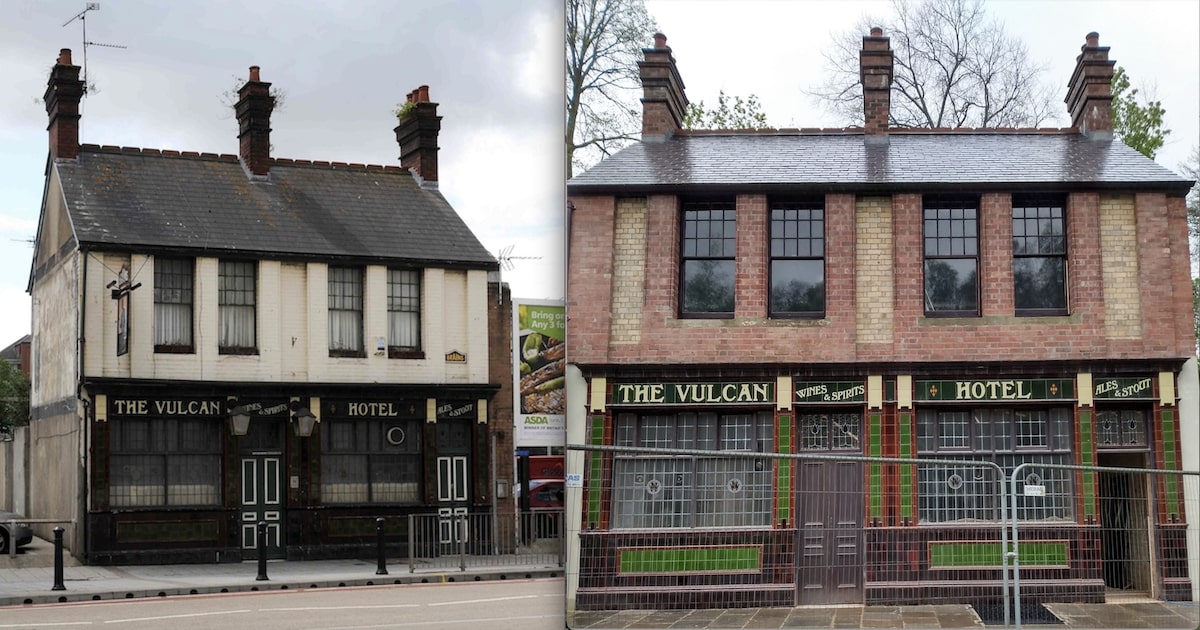Appeal for memories of The Vulcan pub as stunning exterior fully revealed

St Fagans National Museum of History is appealing for anyone with cherished memories, captivating photos, or treasured objects associated with the historic hostelry.
The museum is asking for the public to step forward and become a part of the historic building’s history as The Vulcan is brought back to life.
The Vulcan closed its doors a decade ago in 2012 and was then dismantled brick by brick, to be reassembled in the grounds of the museum.
The scaffolding that surrounded the building has now been removed and the pub has re-emerged ready to continue its proud history.
The refurbished leaded windows of The Vulcan Hotel are now in place. Here is a little of their history.
Do you have any memories, photos or objects associated with the Vulcan?
Please contact us
✉️[email protected] pic.twitter.com/fgIEOqFsVc— Sain Ffagan | St Fagans (@StFagans_Museum) June 15, 2023

The Vulcan, which originally stood at 10 Adam Street, Adamsdown, Cardiff, is being reinterpreted as a working pub as it was in the First World War and displayed as it was in 1915, an important year for the pub.
Its interior had just been redesigned to include gents’ urinals and its distinctive green tiles added to the front of the building.
The pub is being carefully rebuilt using the original stones, bricks and woodwork, all placed exactly in their original positions.
Work on the interior has started with the aim of a local brewery will operating it as a licensed bar.
The aim is that The Vulcan will once more open its doors at the museum in 2024.
Do you have any memories, photos or objects associated with the Vulcan?
Contact the museum via: [email protected]
10 years ago today I took a photo of The Vulcan pub being taken down brick by brick ready to be rebuilt at St Fagans. Looking forward to having a pint there once again – soon. @StFagans_Museum pic.twitter.com/F3mQzNlT12
— geraintday (@geraintday) August 16, 2022
The history of The Vulcan pub
The Vulcan was originally built in Newtown, Cardiff during the 19th century.
It originally opened its doors in 1853.
At the time Cardiff was growing from being a small town to the most important coal port in the world.
Newtown, now long gone, was known as ‘Little Ireland’ because it was home to many Irish people who came across to Wales during the Irish famine to build Cardiff docks.
Originally, beds in the front two upstairs rooms of the Vulcan were rented out to seamen whose ships were in port.
This is why it was originally known as a hotel and pub. The landlord’s family lived in the back rooms.
It was popular with the steel and dock workers from the working class communities.
The pub was built next to the nearby ironworks which provided the inspiration for its name: Vulcan was the Roman god of fire and metalworking, often depicted holding a hammer as used by a blacksmith.
(Credit: St Fagans National Museum of History)
Support our Nation today
For the price of a cup of coffee a month you can help us create an independent, not-for-profit, national news service for the people of Wales, by the people of Wales.







I have a memory: I was playing darts away for the Romilly pub 3rd team in The Vulcan, where I first discovered that darts is a ‘contact’ sport – tripping, shoulder barging, various other forms of intimidation…